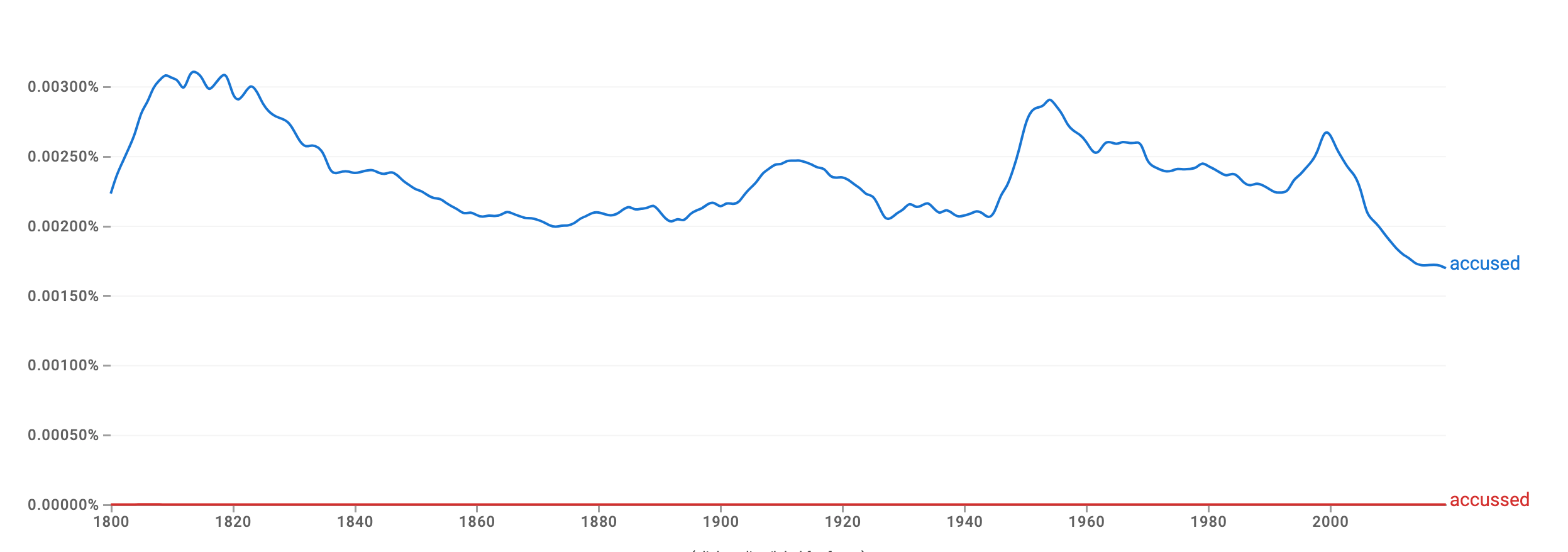- "Accussed" is an incorrect spelling of the word "accused."
- "Accused" is used to describe someone who has been officially charged with doing something wrong, especially a crime.
❌ After a thorough investigation, Mr. Troy was accussed of fraud and embezzlement.
✅ After a thorough investigation, Mr. Troy was accused of fraud and embezzlement.
In this sentence, "accused" means that Mr. Troy has been formally charged or blamed for committing fraud and embezzlement following a comprehensive investigation.
What does "accused" mean?
"Accused" is the "-ed" form of the verb "accuse." It can be a past tense verb, a past participle, or a noun meaning the person who has been accused of a crime.
Accuse (verb)
- To charge someone with an offense or wrongdoing, typically a crime.
- In legal contexts, it involves formally stating that an individual is believed to have committed a specific act that violates the law.
Accused (noun)
- A person officially charged with committing an offense or crime.
- Refers to the individual against whom allegations have been made, and legal proceedings may follow to determine guilt or innocence.

The use of "accused" and "accussed" over time
The Ngram graph below shows how often "accused" and "accussed" have been used from the 1800s to the 2000s. "Accused" has been decreasing in use in the last 20 years, while its misspelling "accussed" has always seen nearly zero use.

How to pronounce "accused"
In American and British English, "accused" is pronounced like "uh·kyoozd."
These are just the standard pronunciations, and there may be slight variations depending on regional accents and individual speech patterns.
Why would we misspell "accused" as "accussed"?
Simple Typos: It's easy to mix up the keys, especially when typing quickly or without proofreading. In this case, some people may type an extra "s," leading to the misspelling "accused."
False Analogies: Some words have double consonants before an "-ed" ending, like "pressed" and "missed." This may mislead someone to think that "accused" follows a similar pattern.
Other common misspellings of "accused"
- Acused
- Accuessed
- Accusued
- Accuused
- Accusd
Example sentences of the misspelling of "accused" as "accussed"
- The court proceedings focused on the evidence against the "accused," not the misspelled term "accussed."
- Legal documents must use the correct spelling, "accused," and not the common misspelling "accussed."
- The judge corrected the prosecutor's use of "accussed" to the accurate legal term, which is "accused."
- In the official report, the detective clarified that the suspect should be referred to as the "accused," dismissing any mention of the misspelled "accussed."
- The defense attorney reminded everyone in the courtroom to use proper legal terminology, including the correct spelling of "accused," not the mistakenly written "accussed."
Example sentences of "accused"
- The accused stood silently in the courtroom, awaiting the judge's decision.
- The lawyer vigorously defended the rights of the accused during the trial.
- Eyewitnesses pointed to the accused as the person they saw at the scene of the crime.
- The police questioned the accused about their whereabouts on the night of the incident.
- The judge emphasized the presumption of innocence until proven guilty for the accused.
- The court granted bail to the accused pending further investigation.
- She was accused of stealing the company's confidential information.
- The suspect was accused of trespassing on private property.
- Despite the alibi, he was accused of committing the burglary.
- The employee was accused of violating the company's code of conduct.
🖊️ Lawyer vs. Attorney: Understanding the Terminology
🖊️ Aquit or Acquit: Which Is Correct?
Synonyms for "accused"
Verb:
- Charged
- Alleged
- Blamed
- Imputed
- Indicted
Noun:
- Defendant
- Suspect
- Party in question
- Person of interest
- Offender

Want to sound like a native speaker?
Engram’s AI-powered grammar checker makes your English sound like a native speaker’s, suggesting natural English expressions on top of fixing grammar, spelling, punctuation, word order, and vocabulary.

References:














